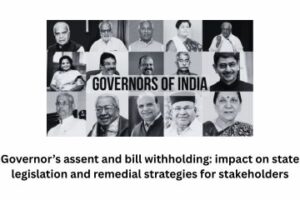Interference of the Central Government
Written By: Fiza Firdaus Ansari
There are two forms of government Unitary and Federal. In Unitary form, maximum power or only source of power lies with the state. A classic example of this form of government is France, Japan, China.
While in a federal form of government the powers are divided between both centre and state. A classic example of this form is U.S and India. In India only during periods of emergency, we follow the unitary form of government. Meaning at the time of emergency more power rest with the centre and States are left with very few powers. Otherwise, during normal times India has a federal form of government as the main feature, and character stick or federal form of government is a division of power between centre and state.
So, if we check out Constitution ever there the power between centre and state is divided under 3 heads:-
- Legislative Relations
- Administrative Relations
- Financial Relations
See, because this is 200th Article. So, two will be there after this add 4,5 and 6 so these are your starting articles.
- Legislative Relations – 245 – 255
- Administrative Relations – 256 – 263
- Financial Relations – 264 – 293
Legislative Relations
If you open the book of Constitution, you might be overwhelmed by the number of articles, technical terms, 7th should you also may subject matter you might feel that it is very technical.
So legislative relations have been discussed in the Constitution from article 245 to article 255. The relations of centre and state have been divided into aspects:-
- Territorial jurisdiction
- Subject matter jurisdiction
Territorial jurisdiction means who can make the law applicable over a certain and specific territory.
While subject matter jurisdiction refers to subject matter laws it can be agriculture, electricity, water projects etc. who can make laws related to such specific matters.
Territorial Jurisdiction
We will understand from here that how is very real Jew decision is decided For that the most important Article is 245.
There are 2 clauses to this article for purpose of understanding now even if I divide article 245 into 3 categories. Foremost article 245 says that the Parliament has the power whenever I use “Parliament” it will mean centre and when I will use the term “Legislature” it will mean state.
The 1st part of article 245 says that Parliament has the power to make laws for the entire that is to be of India or for some part of it.
The 2nd says that state legislature has the power to make laws for the entire territory of that state or part of the territory of that state.
So we have understood that Parliament has the power to make laws for entire of India or for some part of it and legislature has the power to make law for the entire state or some part of it.
3rd part talks about, Extra Territorial Operations which means not the power that Parliament possesses to make laws it does not mean that Parliament can make laws only for people residing in India for their property. No, Parliament, also possesses extraterritorial jurisdiction meaning those persons or those properties situated outside India Parliament can govern them as well.
Extraterritorial power is only possessed by the Parliament and not by the state but in the case where Parliament makes extraterritorial laws of persons residing outside India and their property.
How will it be data mined if the law is right or wrong so far this we have their tutorial Nexus test.
Case:- Wallace V. ITC Bombay (AIR 1948 PC 118)
In this gaze, the air was a company that was registered in England. Now this company was a partner of an Indian firm. In began tags at older do you wanted to tax the entire income of this company.
It was said that since the major income of this company comes from India Indian tax authority has the power to tax, that income. So, that their authorial Nexus test says that if the Parliament wishes to make an extraterritorial law and the subject matter which set law is to govern there must be a reasonable connection between both. So we came to know that through article 245, that Parliament has the power to make laws for the whole of India or some of its part similarly state has the power to make laws for the whole of the state or some part of it but Parliament also has the power to make extraterritorial law state does not have this power.
Parliament does not enjoy absolute power under article 245 and there are 3 exceptions to it.
1st exception is article 246 which says that for Union territory that are:-
- Dadar and Nagar Haveli
- Daman & Diu
- Andaman and Nicobar island
- Lakshadweep Island
For these 4 Union territories president has power that for their “Peace, Progress and Good Governance” he can make regulations the extent of the power of the president to make regulations is so much that for these territories he can amend, modify or repeal the laws of Parliament.
2nd exception is the 5th schedule, where scheduled areas are covered. This exception says is that the governors of this respective state have powers that at any point of time they can declare that in the tribal areas laws of Parliament shall not apply.
3rd exception is that of the 6th Schedule of the states:- Assam, Mizoram, Meghalaya, Tripura the tribal areas of these states. 6th schedule says that the governor’s of these states can at any point of time say that the specific laws of Parliament will not be applied in these areas, or they should be modified or amended.
So, these 3 (Parliament, state and extraterritorial) are exceptions to Parliament’s law-making powers after territorial legislation, 2nd aspect is territorial legislation referring to who has power with regards which subject matter to make laws.
The power that centre & State have been categorized by 7th Schedule in 3 lists.
1st Union list, also known as 1st list
2nd State list, also known as 2nd list
3rd Concurrent list, also known 3rd list
1st union list includes all those things that are of national importance like defence, atomic energy etc.
So, there are total (100) items here Parliament has the exclusive right to make laws related to these items.

About the Author
Fiza Firdaus Ansari
2nd year
B.B.A.LLB (Hons.)
Banasthali Vidyapith
Previous Posts
Right to form association or unions: Constitutional, legislative and judicial perspective
Right to get water: the recent development and constitutional framework
The International Criminal Court as a Court – An Evaluation
Victims of crime: Restoration and Legal care under Indian Criminal Jurisprudence
Keywords:
Interference of the Central Government, Interference of the Central Government in India, Interference of the Central Government in legislation




